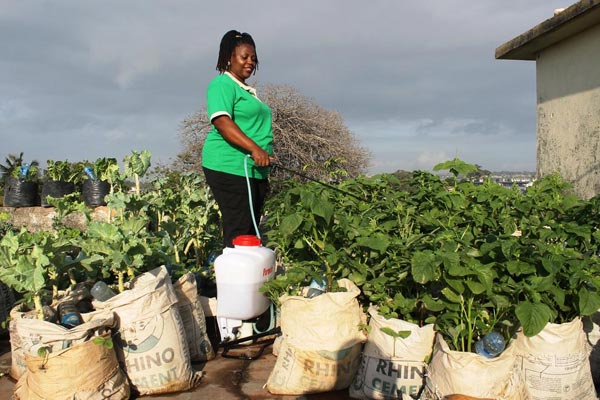Absence of arable land, unfavourable agricultural climate characterised by a hot scorching sun and strong winds in Mombasa have not deterred Tabitha Mwiwawi from growing vegetables.
The 44-year-old has taken her interior design skills to her 4 by 5ft balcony and rooftop where she farms different vegetables for domestic and commercial use.
She grows sukuma wiki (collard green), spinach, amaranthus, tomatoes, dania (coriander), pepper, cabbages, cowpeas, capsicum, brinjals and onions, all under drip irrigation.
Leafy cabbages grown in black plastic bags are on the stairway leading to her two-storey house.
At her balcony, used water bottles are filled with soil mixed with charcoal dust and manure to improve fertility.
They are neatly arranged on a wire mesh rack in what is known as hanging gardens.
Inside the bottles are young flourishing seedlings enjoying the ocean breeze.
“This is my seedbed,” says Mwiwawi as she picks off tiny weeds growing next to the amaranthus seedlings. “I start by growing them here and then transfer them to the main garden made of sacks.”
The garden is on the concrete rooftop, where there is plenty of space.
“I will harvest the sukuma wiki and spinach in few days. Tomatoes, brinjals and dania will be ready for harvest in about a month,” says Mwiwawi as she examines the crops in the sacks.
Mwiwawi credits her lush crops to constant watering and good management.
“I water the crops up to three times a day to ensure they do not suffer from the hot weather,” says the farmer. She has over 1,100 different plants in the 4m by 5m rooftop.
She started in 2012 with Sh10,000. Part of the money went to buying sacks.
She gets a minimum of Sh20,000 a month mainly from vegetables, tomatoes and coriander that she sells to neighbours. It is a tidy sum considering that she eats part of her produce and the farming is part time.
She starts her day by watering the garden between 6am and 9am with the help of her gardener, Douglas Wamwandu.
Wamwandu regularly applies foliar fertiliser to the crops.
“We weed weekly individual crops to avoid transmission of diseases and pests. The onions also help to control pests in the garden,” says Wamwandu.
SUPPLEMENT INCOME
Besides farming, she makes curtains and cushions, among other items for interior decoration. She also makes briquettes for commercial use to supplement her income.
Mombasa district crop director Martin Mbinga says soil is mixed with charcoal dust for aeration and water retention.
“Charcoal has many tiny pores, which allow air in the soil. The tiny pores will further hold water and nutrients for the plants.”
Mbinga says there are good prospects in urban farming and people should embrace it.
“The Ministry of Agriculture has been encouraging urban farming since 2011 by training people to grow food in towns.”
Mwiwawi’s major challenges are heavy rains, water shortage and strong winds that frequently blow from the sea. She controls the winds by placing a barrier near her garden.








